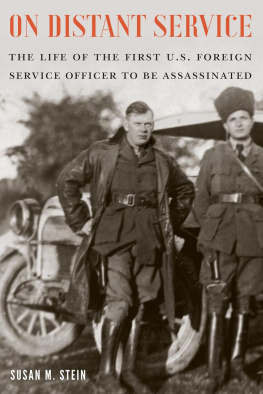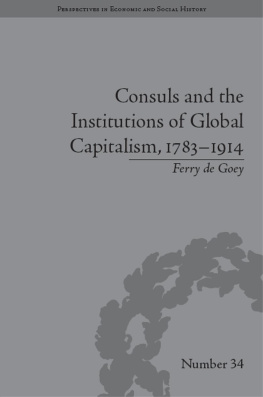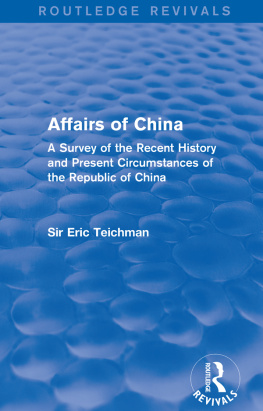Preface to the Second Edition
In the intervening years following the publication of this books first edition, The American Consul: A History of the United States Consular Service, 17761914 (Greenwood, 1990), I hoped that historians would pick up on the important role of American consuls in the development of U.S. relations with the rest of the world. But that did not happen. As the first edition is no longer in print and had been published with a virtually prohibitive price by a firm that caters to the academic library market, I decided to bring out a new edition in paperback.
This new edition adds the period 1914 to 1924, when the Consular Service was integrated with the Diplomatic Service to form the present-day Foreign Service of the United States. This volume thus adds the work of the Consular Service through the end of World War I, the Greek disaster in Turkey, and Germany in the early years of the Weimar Republic.
On a personal note, I discovered with some chagrin that I had left out a family member in this tribute to the American Consular Service. A few years ago, well after I had published the book, I was playing with the Internet and noted that an entry regarding my grandfather, a Civil War veteran, referred to his father-in-lawmy great grandfather Edmund Jssenas a fellow veteran. Checking further I found that Great Granddad had been consul general in Vienna between 1885 and 1889. So this obscure title runs in the family: I was consul general four times.
I want to thank the Association for Diplomatic Studies and Training, Kenneth Brown, Margery Thompson, and Marilyn Bentley for their support in encouraging me to bring out this new edition. The Association generously assigned the following interns to help with the editing of the book, and I thank them all: Jennifer Ricketts, Caroline Lemp, Brad Walvert, Biola Ijadare, Mary Larson, and especially Whitney Kipps, who gave particular attention to polishing the work.
1. Consular Antecedents
The origin of consuls predates that of permanent ambassadors by almost two millennia. The first ambassadors set up residence in foreign countries during the late Middle Ages. An establishment closely approximating a consular service had been created in Egypt in the sixth century B.C. during the reign of the pharaoh Amasis, who, wishing to encourage trade with the Greeks, set aside Naucratis, a city in the Nile Delta, where they could live under their own governors. Those governors had many of the characteristics of modern consuls in that their principal functions were to encourage trade, act as magistrates for their citizens living in Egypt, serve as intermediaries with the Egyptian authorities, and report back to their city-states on political and economic conditions in Egypt. Naucratis was not a Greek colony but existed at the sufferance of the Egyptian Pharaoh, who delegated certain powers to the Greek governors in the manner that countries today will allow foreign consuls to perform certain legal functions for their own citizens.
Having foreign officials in a sovereign country exercising certain authority over their own citizens has a logic that was evident centuries before the exchange of resident ambassadors. The Pharaoh gave the Greeks a place where they were both isolated and protected. Removing them from too much contact with Egyptians also spared the Pharaohs officials from having to deal with disputatious foreign traders and kept the foreigners from corrupting his subjects.
The Greek city-state system, and later that of the Romans, had their versions of consuls. But, with the collapse of the Roman Empire and the advent of the Dark Ages, it was not until the eleventh and twelfth centuries that the trading states of Europe began to reassemble their systems of laws, codes, and commercial practices. Gradually merchants in northern Europe (especially members of the Hanseatic League) and the Mediterranean were enabled to enjoy a certain security in knowing that their goods and agents were not completely at the mercy of capricious local magistrates. With the codification of mercantile practices, consuls began to reappear to help merchants of their cities or states on foreign shores. By the thirteenth century Venice had more than thirty consuls placed abroad in Tunis, Alexandria, Cairo, and Damascus, as well as in all of the major European ports.
As commerce grew, countries and city-states began to send their ambassadors to reside at courts of foreign rulers, rather than to perform a specific mission and then return. These resident ambassadors took away some work consuls had performed, especially in dealing with major problems affecting large numbers of their subjects, but few ambassadors had the interest, experience, or authority to deal with commercial matters, or intercede for merchants or sailors in trouble. Courts and ports were two different worlds, and it took different types of men to deal with each. Even today, although there are attempts to meld professional diplomats with consuls, individual differences in personality and outlook sharply affect preferences for one or the other field of work.
By the eighteenth century the consular network of the major trading nations was well established; consuls in the ports and commercial cities of Europe were gaining respect for their abilities in seeing that the wheels of commerce turning at a proper rate. Some countries appointed their own merchants as consuls, permitting them to continue in private trade while looking after their countries interests and collecting fees for their services. Others appointed foreigners as consuls; attracting men who found it worthwhile to represent a foreign power, either because of the honor or because occupying a quasi-legal position gave them certain trade advantages. A few countries, notably France, the dominant European power, had established a professional consular service.
While consuls in European cities enjoyed prestige and often monetary advantages, their colleagues along the north coast of Africa were in a perpetually precarious position. By the seventeenth century the Ottoman Empire had lost much of its control over its supposedly subject states of Tunis, Tripoli, Algiers, and Morocco. The rule of the Sublime Porte was nominal, but because the Barbary States acknowledged the sovereignty of the Ottoman sultan, other nations wishing to deal with them could not send ambassadors since they could go only to the court of an acknowledged ruler. The consuls position was well suited for this type of situation. A consul could act almost as an ambassador without upsetting the dignity of the sultan in Constantinople. Another reason to put consuls on those inhospitable shores was that they were expendable. In diplomatic usage, endangering or taking the life of an ambassador could be a mortal insult, since the ambassador was the personal representative of the sending ruler. A consul was no more or less than a governmental official; if something happened to him, it might be a matter of concern or even outrage, but not a matter of war.
The European consuls to the Barbary states played a key role in helping clients caught in impossible circumstances. The states of Algiers, Morocco, Tunis, and Tripoli survived by means of war and tribute. Each state had a small navy and vessels fitted out as privateers. These ships preyed on the merchant ships of one or more of the European countries that did not pay tribute to the Barbary rulers.
The consuls helped negotiate and pay the tribute, and arranged for the ransom of their countrymen who had been captured and enslaved during times of war. The consuls might continue their appointed work even while their country was at war with the Barbary states , or they might be thrown in jail. None of these Barbary states were as powerful as Spain, France, England, or a combination of the Italian trading states, such as Venice and Genoa, but they were not put out of business until the nineteenth century. Beggar your neighbor was considered a smart policy.








